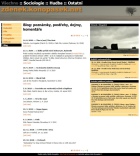
KONOPÁSEK, Z. (2010): Co znamená "sociální konstrukce"? Blog Zdeňka Konopáska, 3. 11. 2010. Dostupné na adrese http://zdenek.konopasek.net/index.php?m=151&i=1490&b=151
::::Dnes mám v rámci oslav 20-letého výročí oslav Centra pro teoretická studia, stejně jako další kolegové, krátce promluvit na libovolné téma ze svého oboru. Rozhodl jsem se v této mini-přednášce shrnout několik vysvětlení k pojmu, který dnes dělá tak často sociologii ostudu, a přitom by nemusel. Tady je ta řeč písemně.
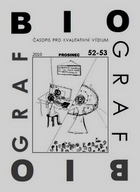
KONOPÁSEK, Z. (2010): V čem spočívá pravda náboženské skutečnosti? Sociologický pohled na mariánská zjevení a démonické posedlosti. Biograf (52-53): 89-101
::::V tomto textu shrnuji východiska a závěry tříletého výzkumného projektu "Jak se dělá náboženská skutečnost: Zjevení a posedlost démony jako praktický a kolektivní výkon" (GAČR 403/08/1758). Opírám se při tom o dosud napsané články, většinou spolu s Janem Palečkem. Stručně: Spojujícím momentem různých našich analýz je mnohotvárnost a praktická různorodost toho, čemu říkáme náboženská víra. Inspirovali jsme se přístupy z oboru současných vědních studií a pokoušíme se o jakousi neredukcionistickou sociologii náboženství. Zvolili jsme za předmět studia podivné, nevšední a v mnoha ohledech sporné situace (zjevení, posedlost), které rozdělují nejen věřící a nevěřící, ale i mnohé věřící navzájem, a které nám umožňují zachytit i tak dlouhodobě a dokonale sedimentovanou skutečnost, jakou je skutečnost náboženská, v pohybu a rozpolcení.
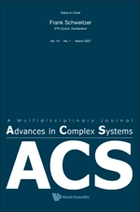
SLANINA, F. / KONOPÁSEK, Z. (2010): Eigenvector localization as a tool to study small communities in online social networks. Advances in Complex Systems, 13 (6): 699–723
::::We present and discuss a mathematical procedure for identification
of small "communities" or segments within large bipartite networks.
The procedure is based on spectral analysis of the matrix encoding
network structure. The principal tool here is localization of eigenvectors
of the matrix, by means of which the relevant network segments
become visible. We demonstrated our approach by analyzing the data
related to product reviewing on Amazon.com. We found several segments,
a kind of hybrid communities of densely interlinked reviewers
and products, which we were able to meaningfully interpret in terms of
the type and thematic categorization of reviewed items. The method
provides a complementary approach to other ways of community detection,
typically aiming at identification of large network modules.
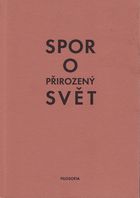
KONOPÁSEK, Z. (2010): Věda, každodenní skutečnost a "přirozený svět". In: B. Velický, K. Trlifajová & P. Kouba, eds.: Spor o přirozený svět. Praha: Filosofia. Str. 173-196
::::V tomto příspěvku se zamýšlím nad pojmem přirozeného světa ze dvou zvláštních sociologických hledisek: z hlediska současných studií vědy a technologií (science and technology studies, STS) a z perspektivy klasického sociálního konstruktivismu. Vysvětluji, zaprvé, proč STS na husserlovskou kritiku vědy (z pozic přirozeného světa) prakticky nenavazují, ač oba proudy bádání nějak problematizují založení vědeckého poznání. Za druhé jsem se snažil vysvětlit, proč a v jakém smyslu klasický sociální konstruktivismus, fenomenologicky založený a z úvah o žitém světě vycházející, znamená vlastně překročení koncepce přirozeného světa (a v důsledku i její opuštění). V obou případech přirozený svět vypadá jako nepříliš realistická a ne zrovna přesvědčivá abstrakce, která nevysvětluje – a asi ani nemůže vysvětlit či ozřejmit – podstatné otázky těchto oborů: tedy jaká je specifická povaha vědy (např. oproti jiným podobám vědění) a co zakládá každodenní svět, který se dá prakticky žít – psychicky, fyzicky i sociálně. Pojem přirozeného světa je dokonce poněkud nešťastný tím, jak navzdory proklamacím a veškeré snaze prohlubuje a stvrzuje propast mezi subjektem a objektem, mezi subjektivním a objektivním. V sociálním konstruktivismu to vyvolává řadu fatálních nedorozumění; a skrznaskrz konstruktivistická STS se těmto zmatkům a rozporům vyhnula tak, že se – podobně jako řada dalších konstruktivisticky založených bádání – od klasické, fenomenologicky založené podoby konstruktivismu zcela distancovala.
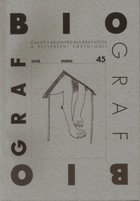
KONOPÁSEK, Z. (2008): Co prý znamená dívat se sociologicky: Povzdech na okraj jedné debaty. Biograf , (45): 119-135
, (45): 119-135
::::V textu se diskutuje obraz sociologie vytvářený během sporů ohledně údajného plagiátorství prof. Ivo Budila v několika málo příspěvcích, které se výslovně dovolávaly “sociologického úhlu pohledu”. Vysvětluji nedorozumění týkající se sociálního konstruktivismu a nezaujatého sociologického stanoviska.
KONOPÁSEK, Z. (2007): Divné řeči okolo nemravnosti. Lidové noviny, 29. 6. 2007. Dočasně dostupné na serveru Lidovky.cz
::::V tomto článku píšu o plagiátorské aféře prorektora Západočeské university v Plzni. Zdůrazòuji, že pobořující není ani tak to, že nějaký akademický pracovník kdysi podle všeho opakovaně, ba systematicky nepřiznaně opisoval z cizích textů; daleko znepokojivější jsou současné zlehčující (a jiné) reakce jeho školy a dalších akademických institucí. Dále vysvětluji, proč považuji za nemístné námitky, podle kterých je celé Budilovo obvinění nesmyslné, protože za ním stojí lidé, kteří mají s Budilem nevyřízené účty.
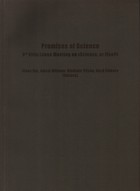
KONOPÁSEK, Z. (2007): The language metaphor in sociology - two different trajectories. In: A. Wittwer, E. Kut, V. Pliska & G. Folkers, eds.: Approaching scientific knowledge: Metaphors and models. Zurich: Collegium Helveticum. Str. 35-42
::::Metafora jazyka patří mezi vlivné metafory v sociologii. Podle Browna jde vlastně o klíčovou metaforu (root metaphor), protože ji používáme jako zcela běžné, často ani nevyslovené obecné zarámování toho, jak si představujeme sociální struktury a procesy, jak je pozorujeme a studujeme. Pro řadu sociologů nejsou sociální jevy jako jazyk, ale vlastně jsou jazykem. Chápat skutečnost jako jazyk či jazykové projevy však může znamenat velmi různé věci; a různé pojetí jazykové metafory se také promítá velmi různým, často rozporným způsobem do sociologické teorie a metodologie. Pro někoho vede metafora jazyka nevyhnutně k významné a politováníhodné redukci: jako sociologicky podstatná se pak přijímá pouze malá část skutečnosti, vlastně jen texty a jazykové promluvy, zatímco zbytek je ponechán stranou. Jiní sociologové berou za svou metaforu jazyka poněkud jinak, vlastně protikladně. Uplatňují to, co o povaze a fungování jazyka víme, na v zásadě kterýkoli prvek tzv. mimo-jazykové skutečnosti. Realita tak není redukována na texty, ale učíme se (nejrůznější) realitě rozumět jako něčemu jazykovému, textuálnímu. V tomto textu tyto dva protichůdné přístupy načrtávám a vysvětluji, abych předvedl jak různý význam může ve vědeckém používání (dokonce v rámci jediné disciplíny) zdánlivě tatáž metafora.
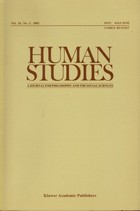
KONOPÁSEK, Z. / KUSÁ, Z. (2006): Political screenings as trials of strength: Making the communist power/lessness real. Human Studies, 29 (3): 341-362
::::In this paper we discuss the problem of communist power in so called totalitarian regimes. Inspired by strategies of explanation in contemporary science studies and by the ethnomethodological conception of social order, we suggest that the power of communists is not to be taken as an unproblematic source of explanation; rather, we take this power as something that is itself in need of being explained. We study personal narratives on political screenings that took place in Czechoslovakia in 1970 and analyze how the power of communists obtained its strength from ordinary and “unremarkable” interactions between participants. The screenings are interpreted, in the terms of Bruno Latour, as “trials of strength.” We show that it was crucial for all the participants that associations, translations or mobilizations involved in making the regime real, remained partial and multiple, and not exclusive and “total” as is often assumed within dominant discourses on totalitarianism.
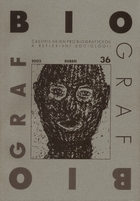
DAVID, G. (2005): Žertování o cenách v arabských koloniálech: Jak mohou citlivá témata proměňovat mezi-skupinové vztahy. Biograf , (36): 25-54 - přeložil Zdeněk Konopásek
, (36): 25-54 - přeložil Zdeněk Konopásek
::::Tensions between small immigrant-owned stores and their African-American customers are frequently cited as a major problem in large urban cities in the United States. Whereas most research has focused on the problematic nature of this relationship, the research reported in this paper attempts to focus on the positive. Rather than being plagued by tensions and problematic encounters, this paper asserts that interactions in small "convenience stores" are largely unproblematic. This paper examines the occurrence of unproblematic cross-cultural encounters as a collaborative effort between customer and worker. Specifically, this paper demonstrates how humor plays an important role in the formation of positive relationships through the analysis of "price humor". While high prices have been cited as a source of tension, this paper shows how sensitive topics, such as price, can be used by interactants to build rapport across the counter.
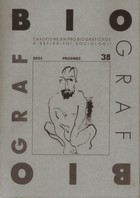
KONOPÁSEK, Z. (2005): Nesnáze s etnometodologií. Biograf , (38): 85-109
, (38): 85-109
:::: 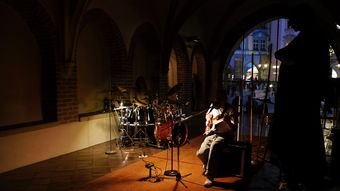
 ? - recenze vyjde v časopise Biograf
? - recenze vyjde v časopise Biograf
 se objevily informace o tom, co lze snad prý během března čekat v nové, sedmé verzi mého oblíbeného analytického programu
se objevily informace o tom, co lze snad prý během března čekat v nové, sedmé verzi mého oblíbeného analytického programu








